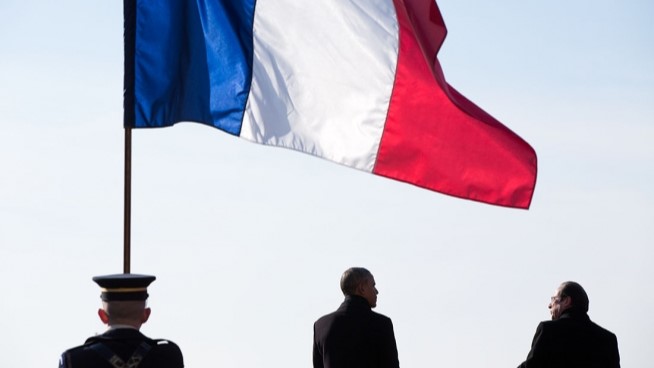French President Francois Hollande arrived in Washington yesterday to further strengthen the U.S.-France relationship, which has greatly improved from its Iraq War-era nadir. Hollande is facing the lowest approval ratings of his presidency and a faltering economic recovery with sustained high unemployment. But even so, French officials have signaled a desire to maintain an active foreign policy with close U.S. cooperation.
The visit is “a nice way for the United States to pay France back for its leadership on Syria, Iran and Mali,” says Nicholas Dungan of the Atlantic Council. The French, for their part, “will be looking to see whether the United States still wants to lead from the front,” he says.
In a jointly authored Washington Post op-ed coinciding with the start of the visit, Hollande and U.S. President Barack Obama acknowledged that “a decade ago, few would have imagined our two countries working so closely together.” But in recent years,
they wrote, the U.S. and France have “expanded our cooperation across the board” and have taken the alliance “to a new level.”
U.S.-France relations are “on the upswing,” says Guillaume Xavier-Bender of the German Marshall Fund, due in large part to the role that France is taking in international security issues. “Hollande is positioning himself as a global leader,” Xavier-Bender adds.
France pursued an active foreign policy in 2013, a year that saw Hollande undertaking military operations in Mali and the Central African Republic, taking a lead role in fashioning an interim nuclear deal with Iran and showing a willingness to take punitive action in reaction to use of chemical weapons in Syria.
In contrast, the United States’ other economically powerful NATO allies are showing continued reticence on the global stage. As Christopher Chivvis of the RAND Corp.
wrote in a recent essay, the British military is “exhausted after the toil of Iraq and Afghanistan” and Germany continues its “reluctance to shoulder a bigger share of Europe’s defense burdens.”
France’s recent actions have especially highlighted the country’s role in Africa, and Defense Minister Jean-Yves Le Drian
devoted much of a recent address in Washington to French activities on the continent. He pointed to the “absence or weakness” of state structures in parts of Africa as creating opportunities for jihadis and militants. To deal with these threats, he said, France is beginning to “increase our deployment as part of a regional approach” that will make France “ready to fight terrorism throughout the Sahel region.”
While emphasizing ongoing threats of violence in Libya, Le Drian argued that other interventions could be necessary in the future. “We cannot allow a threat similar to the one that triggered our military intervention last year to take root again in Mali, nor in any other state in the region,” he said.
But despite these assertive statements, there are limits to France’s ability and desire to involve itself militarily in Africa. Xavier-Bender observes that France is trying to find a “middle ground” in its Africa policy, which would involve changing the French tradition of intervening in its “backyard” to protect its values or to support its friends, but stopping short of a complete French withdrawal from the region.
Overall French military ambitions are also limited by some of the same trends affecting the military expenditures of other industrialized nations. Fielding an expeditionary military continues to be an expensive proposition—though U.S. capabilities have helped to fill in some gaps for France—and the Hollande government has been forced to spend much of its time dealing with France’s slow growth and high unemployment.
Hollande’s response to French economic woes has met with a chilly reception from the French public, causing his approval ratings to dip below 20 percent for the first time in his presidency. Hollande has not been able to deliver on several promises he made on the economy, and his planned labor market and competitiveness reforms may take time to show results.
Going forward, France and the United States have a busy agenda. Among the most high-profile items will be the negotiation of a long-term agreement to limit the Iranian nuclear program. France won plaudits from U.S. conservatives—and reproaches from Iranian diplomats—for its perceived toughness during the previous round of negotiations.
Other prominent issues include progress on climate change ahead of the 2015 U.N. Conference on Climate Change in Paris and the final negotiation of the Trans-Atlantic Trade and Investment Partnership. Obama and Hollande indicated a sense of common purpose on these issues in their joint op-ed, but given the complex effects that such agreements will have across various sectors of the U.S. and French economies, progress on both climate change and the trade agreement will require a tough series of negotiations.
But for the time being, both leaders appear to have found a reliable partner in the other. According to
recent polling from Pew Research, favorable views of the United States in France stand about where they were before the Iraq War, though they are down from the early years of the Obama presidency. “The United States and France continue to be very close,” Xavier-Bender says, “and they don’t hesitate to tell each other when they disagree.”

